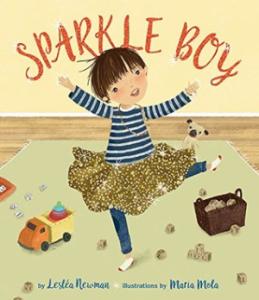Sparkle, sparkle, little boy.

This story structure has been done to death. Younger sibling is doing something harmless that older sibling doesn't approve of. Siblings go somewhere. An outsider criticizes younger sibling for doing said behavior. Older sibling gets mad and sticks up for younger sibling out of solidarity. Older sibling now accepts behavior in younger sibling as if they had never had problems with it to begin with. The end.
I don't find this realistic, and I don't find the change in the older sibling meaningful. They aren't accepting the behavior because of its inherent harmlessness (or even benefits), they are merely switching sides, like they're the only one allowed to insult their sibling. I'm one of those people who doesn't think that Darth Vader earned his redemption at the end of Return of the Jedi. Protecting his son is not the same thing as standing up to the evil of the empire that he helped perpetuate.
But back to this book, specifically. A boy named Casey has an older sister named Jessie. (This is especially weird for me, because my nickname growing up was "Casey" and my younger sister's name is also "Jessie." But I digress. Again.) Jessie likes shimmery and sparkly things, and then Casey, who seems to be about 2 or 3 years old given his vocabulary ("Ooh, sparkly, sparkly. I want sparkly"), sees what she has and wants the same things. Jessie says, "You can't wear a skirt, because you're a boy. Right, Mom?" And the mom says, "No, that's fine with me. Here, have an old skirt that your sister outgrew." Jessie's painting her nails and they're all sparkly, and Casey says, "I want those too." Jessie says, "Daddy, boys don't wear glittery nail polish." And the dad says, "Well I don't see why not. Here, let's try this." And then the grandmother, Abuelita, (so they're a Hispanic family apparently, although the dad's blonde, so maybe mixed-race) gives Jessie a sparkly bracelet, and then Casey wants one too. Jessie says, "You can't have one." Then Abuelita says, "I've never seen a boy wear sparkly bracelets... until now." Then they call him Sparkle Boy. Jessie's mad. She's kind of jealous, I think, that he's basically co-opting everything she thought was uniquely hers. I totally understand; that kind of copying behavior is both super common and super annoying.
Then they go visit the library and Jessie and Casey both have sparkly skirts, painted sparkly nails, and sparkly bracelets. A little girl says to Jessie, "Oh, I like your skirt. And I like your sister's skirt." Casey says, "I'm not a sister, I'm a brother." And the girl says, "Well, you can't be that, you're a girl." He says, "No, I'm a boy." Then a couple of older boys laugh at him and one of them says, "'Dude, you can't go around wearing a skirt.' 'Why?' Casey asked. 'Because you look weird, and everyone will laugh at you.'" So they're laughing at him because everybody will laugh at him, in a circular reasoning kind of way. Instead of going into the (completely invalid) reasons that people might have to raise an issue with this, and shooting them down. Okay, I get it. The kids probably don't understand what's going on, because all of the discrimination is depicted as being from kids towards kids, and that's probably realistic, but what did we learn here? Nothing.
"Boys don't wear skirts and bracelets and nail polish. Everybody knows that." Casey, starting to tear up, asks his sister if she agrees, and she says, "Why can't boys wear skirts and bracelets and nail polish?" And the other say, "Because that's just the way it is." And she says, "Not anymore." It makes it sound like she's making a huge stand, or like she has some kind of power to change the world, when she's just making the decision not to be annoyed by this one behavior of her brother. And then they go home, and she's okay with him being "sparkly" from then on.
Can't we have her come to that conclusion on her own, instead of only in solidarity with her brother? Like if everybody else was okay with it, would she have eventually come around? Or would she have stayed totally against it? It just seems strange and contrived. Like, "I'm the only one who can make fun of this person, you're not allowed to. Because I do it out of love, or whatever." As if a friend or family member's joking insults have never hurt anyone's feelings.
I was hoping to find something that would address the topic of boys being allowed to express themselves in traditionally feminine ways. This isn't a bad book; it just doesn't really fully address it. Don't get me wrong, I think it's great that it exists. It's a good start in this topic, but I think more books need to be written about this sort of thing. Just as girls have had male role models for many many years, it needs to be okay for boys to have female ones. Girls can wear pants and suits. Boys can wear skirts and dresses. On Halloween, nobody bats an eye if a girl dresses up as a specific male character. But boys can't dress up as female characters; that's not allowed. I want to move past the 1970s, Monty Python style humor of "Look, ha ha, it's a man in a dress instead of a woman." Because it's not funny when a woman dresses up as a man, it's just out of the norm. And what we're saying is, of course women dress up as men; men are more powerful. Clearly women should want to be men. Men are superior. And anyway, men are the default. But they don't have to be. And they shouldn't be.